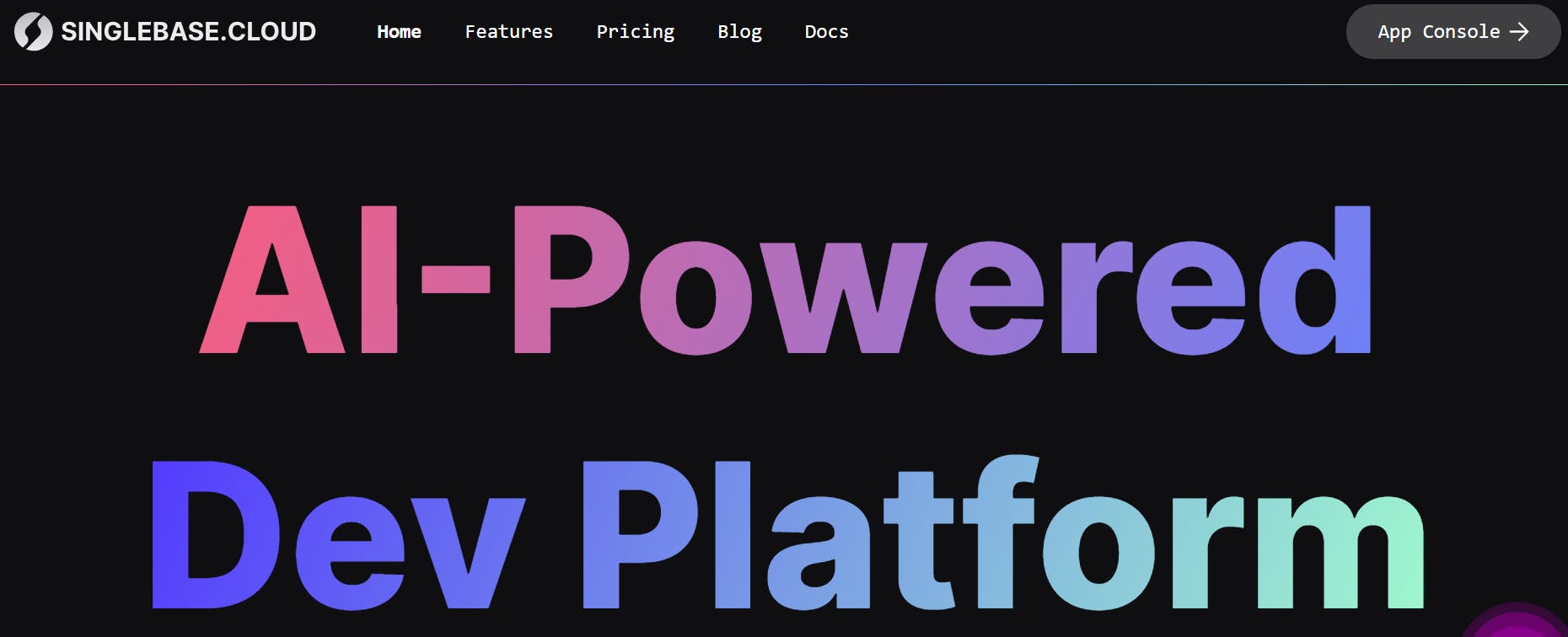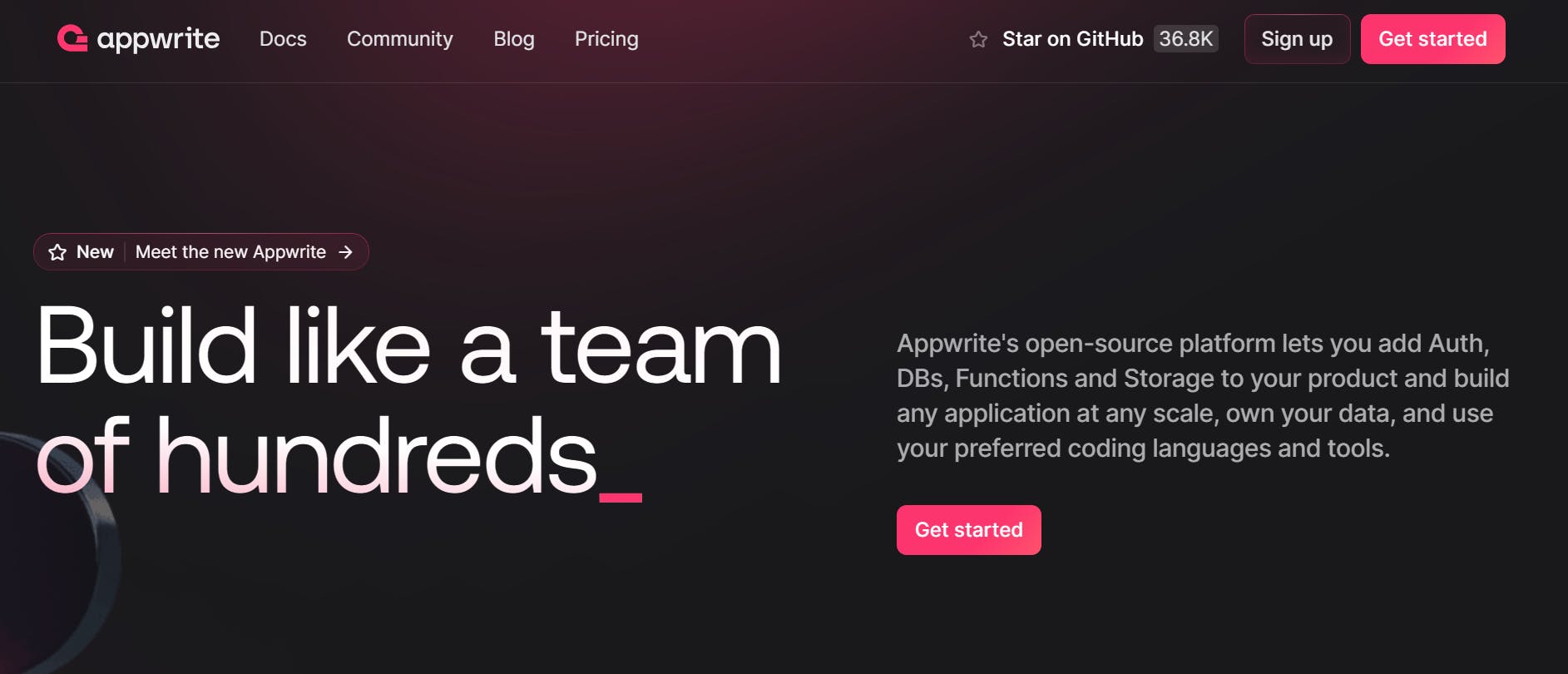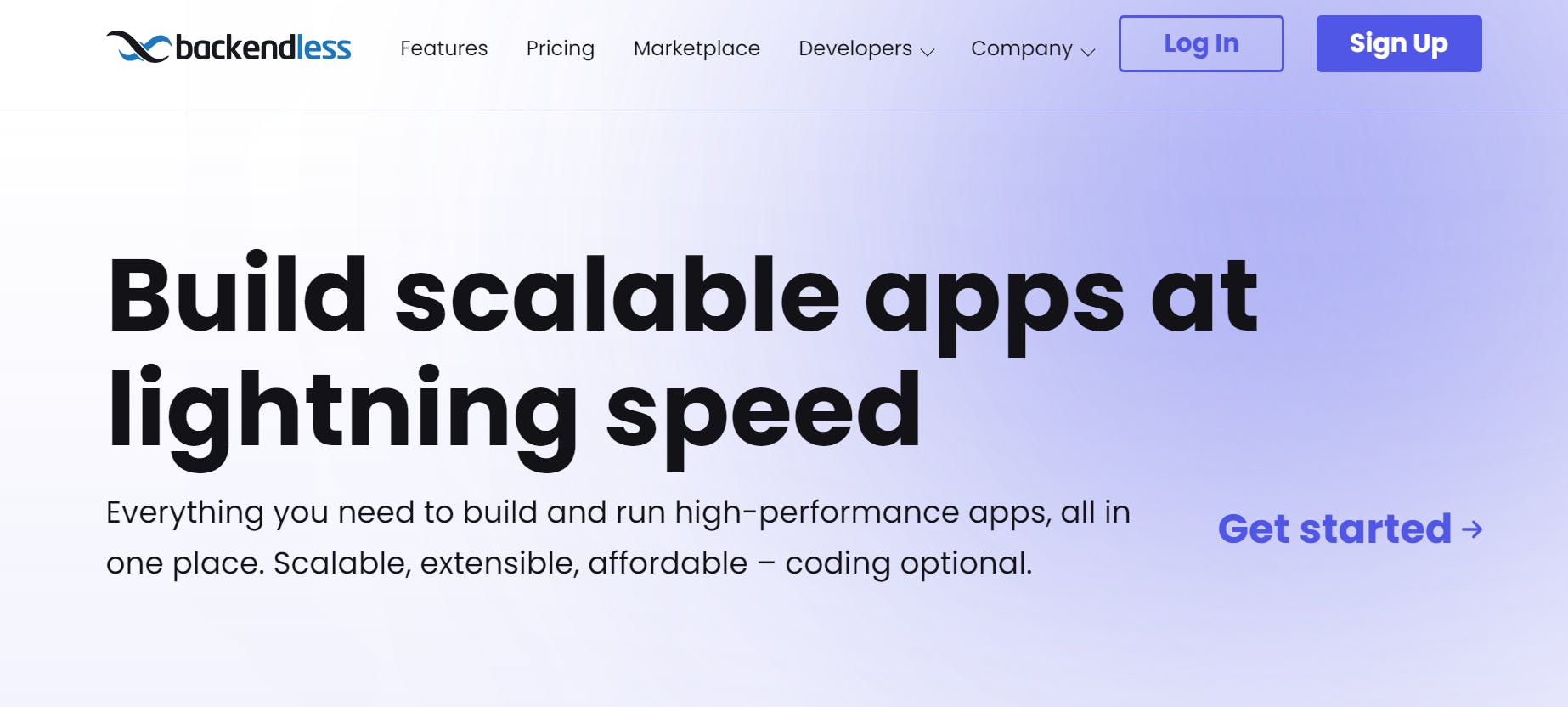Introduction
Building modern applications is becoming increasingly complex as you have to set up many moving parts like authentication, storage, analytics, datastore, etc., and ensure that they work and keep working. At some point, it becomes burdensome for small teams to maintain all these services themselves while ensuring they are scalable, secure, performant, and compatible with other platforms. These responsibilities make it difficult for development teams to ship features fast because they have to worry about many things at a time.
Backend-as-a-Service (BaaS) helps developers and development teams to move from building to production faster by outsourcing the entirety of the backend to a reliable BaaS provider and focusing more on the frontend. The emergence of BaaS has helped many startups move from idea to market in an incredibly short time because BaaS providers offer most (or all) of the services you would need for your backend out-of-the-box, so you don’t have to reinvent the wheel.
Supabase is one of the leading BaaS providers, providing development teams with features such as real-time relational databases, storage, authentication, search, and edge functions. It is open source, fast, scalable, and offers a dedicated Postgres database, allowing developers from a relational database background to build applications efficiently. However, it may be difficult for developers unfamiliar with non-relational databases to perform complex tasks with Supabase.
This article will discuss some alternatives to Supabase, their features, cons, and why you may want to use them.
Why Consider Supabase Alternatives
Supabase is a great BaaS provider with many built-in features and integrations that help you build scalable applications. It is open-source, and its cloud offering is cost-friendly, with a generous free tier to get you started. However, there are a few cons to it. The following are some of the cons of Supabase from a developer’s perspective.
Learning Curve: Supabase is user-friendly and has easy-to-use SDKs to help you build your application. However, if you are not from a relational database background or are unfamiliar with SQL queries, performing complex operations in Supabase may be difficult.
Complexity for Small Projects: Supabase has many services and out-of-the-box features that can be overkill for small projects. You may opt for simpler solutions for efficiency reasons if you all need for your project is only a simple database without authentication or search.
Still in Beta: As of November 2023, Supabase is still in beta. It might not be something to worry about, but beta products are usually less reliable as breaking changes can be introduced at any time.
Sparse Documentation on Self-Hosting: Self-hosting Supabase can be difficult because of sparse documentation.
Delivery of Real-Time Updates Not Guaranteed: There is no guarantee of quick delivery of all the messages sent in quick succession. A user raised the issue recently on Reddit.
The complexity of Row Level Security (RLS): Everybody knows how important data security is, and no product owner wants to put their users’ data at risk. Supabase thinks highly of security and uses industry-standard security measures like data encryption and row-level security to keep your data safe. However, it can be difficult to write row-level security policies if you do not have pre-existing knowledge about them. This difficulty presents a hurdle for developers who want to implement robust access control policies for their databases.
If the cons highlighted are a deal breaker for you, the next section dives into some of the alternatives of Supabase, their features, pros, and cons, so that you can decide which BaaS provider is best for your project.
Top Supabase Alternatives
There are many alternatives to Supabase. In this section, we shall look at the top alternatives to Supabase and see how they compare or differ from Supabase, their features, and limitations. The list below will help you pick the right BaaS provider that suits your project needs.
SinglebaseCloud
SinglebaseCloud is a cloud-based Backend-as-a-Service provider that resembles Firebase closely but without the limitations of Firebase. It handles all the backend complexities so you can focus only on the frontend and move fast. Features like vector database, AI search, document datastore, analytics, storage, etc., are provided out of the box with no extra configurations. SinglebaseCloud allows you to be in charge of everything by enabling the services you want to use and disabling the ones you don’t need. For example, you can choose to enable authentication for your application, disable storage, or enable datastore access - use only the services you need. You are in charge!
SinglebaseCloud is secure and scalable by default. It scales up automatically as load increases and scales down at less load, making your app performant regardless of the number of concurrent requests.

Unlike Supabase, SinglebaseCloud uses a document database that processes and manages unstructured data. Its NoSQL document database is equipped with SQL capabilities to allow you to retrieve data quickly and perform advanced querying and indexing.
Pros
Vector Database: SinglebaseCloud offers vector databases for storing, indexing, and querying vector embeddings to perform similarity searches.
Vector Search: Vector Search, also known as AI Search or Similarity Search, helps you retrieve information from a vector database by calculating the closeness or distance of a given data, making your application fast and intuitive. No more limitations from keyword search as you can now unlock dynamic and intelligent search results based on meaning or context
NoSQL Document Datastore: SinglebaseCloud’s NoSQL document datastore is optimized to store, process, and retrieve large unstructured data seamlessly. The datastore has advanced querying and indexing capabilities for quick data retrieval. The SinglebaseCloud datastore allows the use of SQL queries to perform database operations.
Efficient Storage System: SinglebaseCloud offers an efficient storage system for storing, manipulating, and managing your app’s files and media. The storage system has features like automatic backups, access controls, and versioning.
Robust Image Processing Capabilities: You can store, retrieve, manipulate, and deliver images with SinglebaseCloud at scale and with abilities to cache and automatically resize them on the fly.
Industry Standard Authentication System: SinglebaseCloud has industry-standard authentication built-in to make your application secure. It also offers multi-factor authentication with password, OTP, and social login options.
Other pros of SinglebaseCloud are insightful analytics to enable you to make data-driven decisions in your application, efficient search capabilities, predictable pricing, and up-close developer support.
Cons
SinglebaseCloud is new. There are only a few complex applications built with it at the time of writing this article.
It is not open source. You cannot go into the codebase to tweak things to meet your needs or add new features by yourself, and neither can you self-host.
Small community. SinglebaseCloud has only a small community around it at the time of writing this article. If you get stuck while building, you might not quickly get a helping hand to resolve your issues unless you reach out to the SinglebaseCloud team.
It uses a NoSQL document datastore. The NoSQL datastore might be a constraint if you prefer relational databases to document databases. However, SinglebaseCloud’s document database allows you to write SQL queries to store, retrieve, and manipulate data quickly.
Nhost
Nhost is an open-source GraphQL-based Backend-as-a-Service. It resembles Supabase closely as they both use the Postgres database. Nhost provides a fully managed and scalable backend solution with built-in features such as authentication, storage, datastore, serverless function, and GraphQL API. It also allows you to incorporate custom software within your project environment. You can seamlessly include homegrown backend services inside your Nhost project environment.

Pros
Multi-option Authentication System: Nhost has a ready-to-use authentication service with many sign-in methods such as Email and Password, Magic Link, SMS, Security Keys, Apple, Discord, Facebook, GitHub, Google, LinkedIn, Spotify, Twitch and WorkOS. Your users can sign-up and sign-in with any option that is convenient.
Postgres Database: Nhost spins up a Postgres Database for every project. You can manage the database via Nhost Database UI, Hasura Console, or by connecting directly to the database.
Efficient Storage System: Nhost offers an efficient storage system to store files. Files are stored in S3 and served over CDN. The Nhost Storage is partially integrated with the GraphQL API and allows image transformation on the fly.
Serverless Functions: Nhost allows you to execute custom code by deploying Serverless Functions. You can use serverless functions to handle form submissions, integrations, and event triggers.
Cost-Friendly: Nhost is relatively cheap. Its Pro plan costs $25/month. It also has a generous free tier to get you started.
Cons
GraphQL Is at Its Core: Nhost generates GraphQL schemas based on your database. It might be a turn-off for you if you do not like GraphQL.
Relational Database: Like Supabase, Nhost uses a Postgres database. You may not enjoy this if you are coming from a non-relational database background.
Small Community: Nhost was created in 2019. The community around it is relatively small.
Appwrite
Appwrite is an open-source BaaS platform that enables developers to build applications at scale. It has functionalities like authentication, database, storage, functions, and real-time events. Appwrite uses a NoSQL database. In the future, it will support both SQL and NoSQL database adapters.

Pros
NoSQL Database: Appwrite offers a NoSQL database that supports relationship data and allows storing, manipulating, and retrieving structured data.
Robust Authentication: Appwrite’s identity management services allow developers to implement authentication methods like custom JWT, OAuth, and email/password signup.
Cloud Functions: You can extend the functionality of your application on Appwrite by writing and deploying serverless functions in response to database events.
Storage: You can store videos, images, documents, and other files inside the Appwrite storage. Appwrite provides APIs to download, upload, list files, and delete items.
Cons
Appwrite is a relatively new platform, so the community is still small.
Learning Curve: It may take some time to understand how things work on Appwrite.
Appwrite Cloud is in public beta, so expect that everything might not work perfectly.
Customization Complexity: Customizing your backend may involve writing a lot of custom code.
Back4App
Back4app is a low-code BaaS built on top of the open-source Parse Platform and helps you build a scalable and secure backend for your application. It offers a range of features to build modern applications like Cloud Functions, Storage, Authentication, Real-Time Database, and Blockchain Storage. Back4app allows you to store and query relational data from the Cloud via REST or GraphQL API.

Pros
Real-Time Databases: Back4app allows you to store and query relational data in real time. You can perform relational queries, geo-queries, constraints, and aggregate.
Cloud Functions: You can add server-side business logic to your existing Back4app application using cloud functions. The Back4app cloud function seamlessly integrates with other features like database and authentication.
Seamless Data Querying: Use your preferred method to query data. Back4app offers REST & GraphQL APIs and SDKs to make data fetching seamlessly fast.
Complete Authentication System: Back4app helps you handle user management with its built-in authentication system. You can check for the prior existence of a user, check the authenticity of email addresses, and encrypt passwords with the Back4app authentication system. It also supports social sign-in with Apple, Facebook, Twitter, and more.
File Storage: Back4app’s CDN lets you store and deliver content like images and videos at scale.
Blockchain Storage: Back4app has an out-of-the-box solution to store data on the Blockchain.
Cons
Document Database: Although Back4app allows relational queries, it uses MongoDB at its core.
Limited Scaling: Back4app allows a limited number of concurrent connections. This could affect your application as you scale up.
Not Open Source: Although Back4app relies heavily on the Parse Platform, which is open source, Back4app itself is not an open-source platform, so you cannot make changes or add features directly in the code.
Backendless
Backendless is different from the others mentioned thus far. It is a visual low-code app builder for developing full-stack applications. Backendless provides BaaS features like authentication, caching, database, logging, pub-sub messaging, etc., plus a no-code drag-and-drop visual builder for creating user interfaces.

Pros
All-in-one Full-Stack Solution: Backendless is a complete solution for building full-stack applications with cross-compatibility. It helps you build the entirety of your application efficiently without switching tools.
Offers BaaS features like authentication, logging, pub-sub messaging, geolocation, database, etc., out of the box.
Cons
It becomes complex as your app grows. While Backendless allows you to build full-stack applications faster, things can quickly get mixed up as your app grows.
Limitation in Customization: As your app grows and your needs change, you may discover that features that you require are not available on the platform
Third-Party Dependency: Backendless depends heavily on third-party services. It could become an issue if any of the services it relies upon experience downtime.
Conclusion
In conclusion, the landscape of modern application development is evolving rapidly, and it's becoming increasingly complex to manage various backend services while ensuring scalability, security, and performance. Backend-as-a-Service (BaaS) has emerged as a game-changer, allowing development teams to focus on building frontend features while outsourcing the backend complexities.
Supabase, a leading BaaS provider, offers a range of features and is open-source, making it a strong choice for many projects. However, it is essential to consider the cons, such as a learning curve for non-relational database users, its beta status, and challenges with real-time updates and complex security policy implementations.
Exploring alternatives to Supabase can help you find the perfect fit for your project's needs. Several options are available, including SinglebaseCloud, Nhost, Appwrite, Back4app, and Backendless, each with its unique set of features, pros, and cons. Choosing the right BaaS provider depends on your project requirements, team expertise, and scalability needs.
Ultimately, the decision should align with your development goals and preferences. Whether you prioritize a NoSQL database, real-time updates, vector database, vector search, or an all-in-one solution, the alternatives to Supabase offer a diverse range of options to help you navigate the complex world of modern application development.

